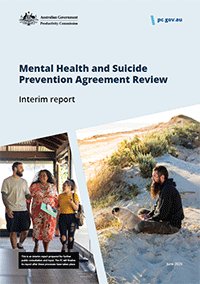Mental Health and Suicide Prevention Agreement Review

Interim report
Released 24/ 06/ 2025
The Productivity Commission (PC) has been asked by the Australian Government to conduct the final review of the National Mental Health and Suicide Prevention Agreement. In this interim report, the PC presents its initial findings and draft recommendations and invites further information and feedback from interested people and organisations.

Briefing video
National Mental Health and Suicide Prevention Agreement ‘not fit for purpose’
The Productivity Commission (PC) has found the National Mental Health and Suicide Prevention Agreement is fundamentally flawed. The interim report of the PC’s review of the agreement finds that achieving reform in the mental health and suicide prevention system will require a new approach in the next agreement.
Governments signed the National Mental Health and Suicide Prevention Agreement in 2022 with the objectives of strengthening collaboration and improving the outcomes for people with lived and living experience of mental ill health and suicide.
But the interim report finds it has made little progress towards these objectives.
“The Agreement comprises a raft of outputs and initiatives that aren’t connected to each other or to an overarching strategy. In its current form, it cannot deliver the systemic, coordinated change it promises,” said Commissioner Selwyn Button.
The report and the accompanying ‘What we’ve heard so far’ paper provide extensive first-hand evidence of a system falling short.
“The consumers, carers and service providers we spoke with told us of ongoing challenges accessing and affording care and of uncoordinated services that do not respond to need,” said Commissioner Button.
Issues with the Agreement are highlighted by its failure to deliver on a key commitment: developing arrangements to provide psychosocial supports outside the NDIS.
“When the NDIS was introduced, governments withdrew much of the funding for psychosocial supports. This has left 500,000 people living with mental illness without support. Addressing this gap requires exactly the kind of national coordination that the current Agreement has proven unable to provide,” said Commissioner Angela Jackson.
While most of the outputs in the Agreement have been delivered, this has not created meaningful change. Funding commitments in the Agreement are limited and many key commitments, like supporting better outcomes for Aboriginal and Torres Strait Islander people, are not funded at all.
Governance structures to implement initiatives are inconsistent, and accountability is limited to high-level progress reports, with no consequences for stalled implementation. Despite emphasising the need to incorporate the voices of people with lived and living experience in the system, the Agreement does little to achieve this.
“To see real progress, governments must collaborate effectively under a shared strategy. A new national agreement that learns from the mistakes of the current agreement is the best way forward,” said Commissioner Jackson.
The PC is recommending that the current Agreement be extended to 2027 to allow time for the new agreement to be co-designed with consumers, carers and service providers.
“Our consultation shows that people involved in the system know what needs to change. The new Agreement needs to be delivered with them not just for them. We need to extend the Agreement to provide enough time for the next Agreement to be genuinely co-designed,” said Commissioner Button.
“To fulfil its purpose, the next agreement needs focused objectives and tangible commitments to achieve them. It must make governments accountable for delivering specific and measurable outcomes,” said Commissioner Button.
The PC is now calling for submissions to inform the final report of the Review, which will be handed to Government in October 2025.
Media requests
02 6240 3330 / media@pc.gov.au
- The mental health and suicide prevention system is fragmented and out of reach for many people. The National Mental Health and Suicide Prevention Agreement represents the commitment of governments to work together towards a person-centred, integrated mental health and suicide prevention system.
Under the Agreement, the Australian, state and territory governments committed to progress an ambitious set of outcomes through national outputs and specific actions contained in bilateral schedules. - The actions in the Agreement do not advance system reform.
As a result, consumers, carers and practitioners report that services remain unaffordable and difficult to access and are not always able to respond to people’s needs. This is despite governments’ progress in implementing actions under the Agreement and the substantial efforts of many working across mental health and suicide prevention services. - Key commitments in the Agreement have not been delivered and should be completed as a priority. Governments should immediately work to resolve the commissioning and funding responsibilities for psychosocial supports outside the National Disability Insurance Scheme – a service gap affecting 500,000 people.
Governments should immediately release the completed National Stigma and Discrimination Reduction Strategy and comprehensive guidelines on regional planning and commissioning for primary health networks to deliver greater access to mental health and suicide prevention services. - A new policy architecture is needed to articulate the collective actions that will deliver changes to the mental health and suicide prevention system and improve outcomes
To be effective, the new policy architecture should be developed by governments in a process of co‑design with people with lived and living experience of mental ill health and suicide, their supporters, families, carers and kin as well as service providers and practitioners. - The current Agreement should be extended until June 2027 to allow sufficient time for co‑design of the new policy architecture. This architecture should contain:
- a long-term strategy for reform
- a five-year national agreement to tackle key priorities
- bilateral schedules to direct funding of services that respond to local needs
- new separate schedules on services to support the social and emotional wellbeing of Aboriginal and Torres Strait Islander people and suicide prevention.
- The next national agreement should comprise:
- a clear set of objectives relating to the long-term vision set out in the National Suicide Prevention Strategy and a renewed National Mental Health Strategy
- a set of specific and measurable outcomes focusing on what is achievable within the scope of a five‑year agreement and clear accountability structures
- tangible commitments clearly linked to the objectives and outcomes it aims to achieve.
- The next agreement should formalise the role of the National Mental Health Commission as the entity responsible for independent assessment and reporting on progress.
- Preliminaries: Cover, Copyright and publication detail, Opportunity for comment, Terms of reference, Disclosure of interests, Acknowledgements and Contents
- Overview - including key points
- Draft recommendations, findings and information requests
- What we’ve heard so far
- 1. The role of the Agreement and this review
- 1.1 The National Mental Health and Suicide Prevention Agreement
- 1.2 How the PC is assessing the Agreement
- 1.3 Next steps for the review
- 2. What has the Agreement achieved?
- 2.1 What do we know about the state of the mental health and suicide prevention system?
- 2.2 Assessing progress is not straightforward
- 2.3 Some progress has been made on the Agreement’s commitments
- 2.4 Key commitments have not been fulfilled
- 2.5 Progress towards a coordinated, person-centred system is very slow
- 3. Is the Agreement effective?
- 3.1 The Agreement has not been set up for success
- 3.2 The Agreement does not embed the voices of people with lived and living experience
- 3.3 The Agreement’s governance lacks effectiveness and accountability
- 3.4 The Agreement is not enabling reform
- 4. Towards an effective agreement
- 4.1 A new agreement and national strategy are needed
- 4.2 Effective goal setting and connected actions for the next agreement
- 4.3 Changes to the structure and development of the next agreement
- 4.4 Addressing unresolved issues from the current Agreement
- 4.5 Opportunities to strengthen governance
- 4.6 Strengthening accountability mechanisms through better use of data
- 4.7 Enabling adoption and diffusion of best practice services
- 5. Services for Aboriginal and Torres Strait Islander people
- 5.1 Aboriginal and Torres Strait Islander social and emotional wellbeing
- 5.2 The Agreement includes extensive commitments to improve social and emotional wellbeing
- 5.3 What progress has been made?
- 5.4 The next agreement
- 6. Suicide prevention
- 6.1 What progress has been made?
- 6.2 Suicide prevention is not well set up in the Agreement
- 6.3 Suicide prevention in the next agreement
- A. Public consultation
- A.1 Consultation and submissions
- A.2 Online survey methods and sample
- Glossary and abbreviations
- References
Printed copies of this report can be purchased from Canprint Communications.
You are invited to make written submissions by Thursday 31 July 2025.

